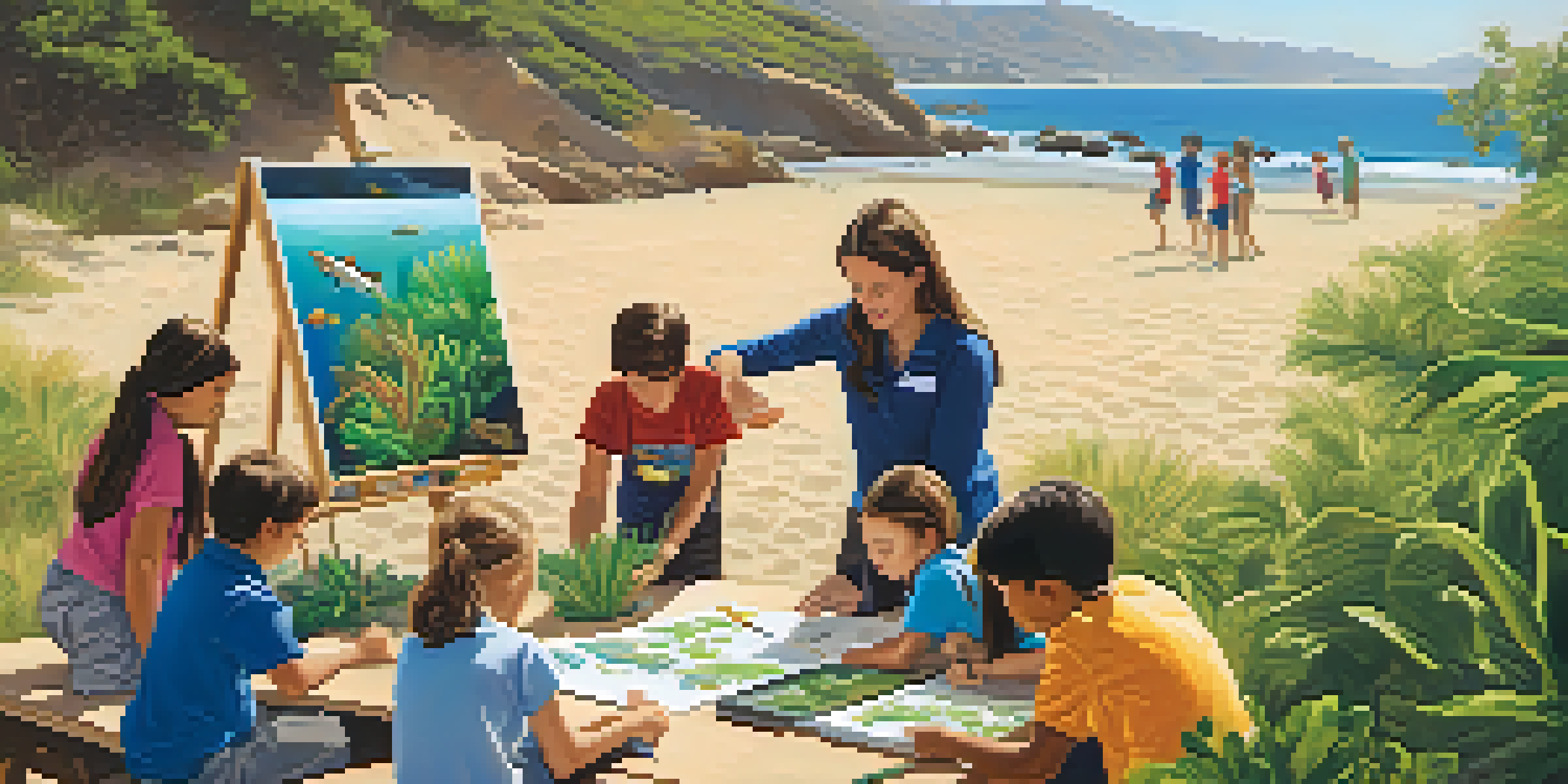Malibu's Schools: Integrating Environmental Education Initiatives

The Importance of Environmental Education in Schools
Environmental education is essential in today’s world, where climate change and sustainability are pressing issues. Schools in Malibu recognize that teaching students about the environment not only raises awareness but also empowers them to make a difference. By integrating these vital lessons into their curricula, schools can cultivate a generation of eco-conscious individuals.
The environment is where we all meet; where we all have a mutual interest; it is the one thing all of us share.
Students learn about local ecosystems, conservation practices, and the impact of human activity on nature. This education goes beyond textbooks; it encourages hands-on experiences, such as field trips to the beach or local parks. These real-world applications help students connect with their surroundings and understand the importance of protecting them.
Moreover, environmental education instills values like responsibility and stewardship in students. They learn that their actions, no matter how small, can contribute to a healthier planet. This mindset is crucial as we face global challenges, and it helps ensure that future leaders prioritize sustainability.
Malibu Schools: A Commitment to Sustainability
Malibu's schools have made significant strides in promoting sustainability within their communities. By implementing eco-friendly practices, such as recycling programs and energy-efficient buildings, they set an example for both students and families. This commitment not only benefits the environment but also teaches students the importance of sustainable living.

In addition to physical changes, schools encourage student-led initiatives, like garden clubs and clean-up days. These activities foster teamwork and allow students to take ownership of their environment. By engaging in these projects, students see the direct impact of their efforts, reinforcing the lessons learned in the classroom.
Empowering Students Through Education
Environmental education in Malibu schools cultivates eco-conscious individuals who are equipped to make a positive impact on the planet.
The community's support plays a vital role in this commitment. Local organizations often partner with schools, providing resources and expertise to enhance environmental education programs. This collaboration creates a robust network of support that benefits both students and the broader Malibu community.
Curriculum Innovations: Integrating Nature into Learning
Innovative teaching methods are crucial in integrating environmental education into the curriculum. Malibu schools are creatively weaving environmental topics into subjects like science, art, and even history. This cross-disciplinary approach helps students see the interconnectedness of their studies, making learning more engaging and relevant.
Education is the most powerful weapon which you can use to change the world.
For example, science classes might involve experiments related to local marine life, while art classes could focus on creating projects from recycled materials. Such projects not only spark creativity but also reinforce the importance of sustainability in everyday life. Students feel empowered to think critically about the world around them.
By utilizing local resources, such as beaches and nature reserves, teachers provide students with unique hands-on experiences. These field-based lessons allow students to explore, observe, and learn directly from their environment, bringing textbook concepts to life. This experiential learning is key to fostering a deeper understanding of environmental issues.
Engaging Families in Environmental Education
Engaging families in environmental education is essential for reinforcing lessons learned at school. Malibu schools actively involve parents through workshops, events, and volunteer opportunities. This collaboration helps bridge the gap between home and school, creating a community that values sustainability.
Events like beach clean-ups and eco-fairs provide families with practical ways to participate in environmental initiatives. These activities not only promote family bonding but also instill a sense of shared responsibility for the planet. When parents are involved, students are more likely to embrace eco-friendly habits at home.
Community Support for Sustainability
Collaborative efforts between schools, families, and local organizations enhance environmental education and promote sustainable practices.
Additionally, schools provide resources and tips for families to adopt sustainable practices. From energy-saving hacks to eco-friendly product recommendations, these insights empower families to make informed choices. This collective effort amplifies the impact of environmental education beyond the classroom.
The Role of Technology in Environmental Learning
Technology plays a pivotal role in enhancing environmental education in Malibu schools. Digital tools and platforms provide students with access to a wealth of information on environmental issues. This enables them to stay updated on the latest research and developments in sustainability.
Interactive apps and games can make learning about the environment fun and engaging. Students can explore virtual ecosystems, participate in citizen science projects, and even track their carbon footprints. These activities not only make learning enjoyable but also encourage a deeper connection to environmental topics.
Moreover, technology facilitates collaboration beyond the classroom. Students can connect with peers from different regions or countries, sharing insights and solutions to environmental challenges. This global perspective enriches their understanding and reinforces the idea that environmental stewardship is a shared responsibility.
Local Partnerships: Enhancing Environmental Education
Local partnerships are instrumental in enhancing environmental education initiatives in Malibu. Schools collaborate with environmental organizations, universities, and community groups to provide students with diverse learning opportunities. These partnerships create a rich tapestry of resources that supports sustainability education.
For instance, local organizations may offer workshops or field trips, allowing students to learn directly from experts. These experiences can ignite passion and curiosity about the environment, leading to lifelong commitments to sustainability. Students benefit from real-world insights that enrich their academic experiences.
Innovative Teaching Methods
Malibu schools creatively integrate environmental topics into various subjects, fostering a deeper understanding of sustainability among students.
These collaborations also foster a sense of community. When schools, families, and local organizations work together, they create a unified front in the fight for a healthier planet. This collective effort demonstrates the power of community engagement in driving meaningful change.
The Future of Environmental Education in Malibu
Looking ahead, the future of environmental education in Malibu appears promising. As awareness of climate change grows, schools are prioritizing sustainability more than ever. This shift suggests an ongoing commitment to preparing students for the challenges they will face in the coming years.
Innovations in teaching methods and technology will continue to shape how environmental education is delivered. Schools are likely to explore new ways to engage students, making learning about the environment dynamic and relevant. This adaptability will be key to sustaining student interest and involvement.

Ultimately, the goal is to create environmentally literate citizens who are equipped to make informed decisions. By investing in environmental education today, Malibu's schools are paving the way for a brighter, more sustainable future. Together, they are nurturing a generation ready to tackle the pressing issues of tomorrow.